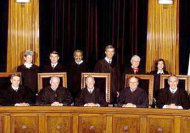5/13/2008
California: Appeals Court Rules Car Seizure Not RequiredCalifornia appeals court rules police not liable for crash if car not seized from driver with suspended license or accused of DUI.

California's Third District Court of Appeals ruled Friday that police do not have a mandatory duty to seize cars from those accused -- but not convicted -- of driving either under the influence (DUI) or on a suspended license. The unanimous three-judge panel came to this conclusion in the case of two California Highway Patrol (CHP) officers who arrested Scott St. Pierre on the morning of March 17, 2004. After responding to the scene of a minor accident involving St. Pierre, the patrolmen concluded that the man's driving had been impaired from the use of prescription drugs and that his driving license was suspended.
At 6:30pm that evening, police released St. Pierre from jail and allowed his mother to recover the car from the Folsom Towing lot where it had been stored. Three hours later, St. Pierre got behind the wheel and caused an accident that killed Jerry Walker.
Amanda and Carl Walker, the victim's wife and son, sued the CHP on the grounds that the officer's failure to confiscate St. Pierre's property resulted in Jerry Walker's wrongful death. A trial court agreed that once police take a car under the suspended license statute, they must keep it for thirty days. The appeals court rejected this approach as a technical misreading of the law.
"The trial court determined that the words 'may either' required an officer taking action under this statute to do one of two things... In fact, this court has previously rejected such an interpretation," the appeals court explained. "The phrase 'may either' does no more than apply the 'may' to both of the succeeding clauses. Thus, section 14602(a)(1), in effect, says only that an officer 'may... immediately arrest th[e] person and cause the removal and seizure of th[e] vehicle or... [may] cause the removal and seizure of the vehicle without the necessity of arresting the person."
The court went on to discuss how this interpretation fits with the statutory history and intent of the legislature. If the lower court's interpretation were correct, the appellate court argued, the state would need to have the capacity to store one million cars because of the sheer number of the state's unlicensed drivers.
"One cannot overstate the logistical difficulties that would ensue if all California police officers arresting an individual for driving with a suspended or revoked license were required to impound that individual's vehicle for 30 days," the court concluded. "We cannot find that the legislature intended to create a mandatory impoundment provision that raises significant public policy considerations."
The court then ordered dismissal of the suit against the highway patrolmen. A complete copy of the ruling is available in a 40k PDF file at the source link below.


